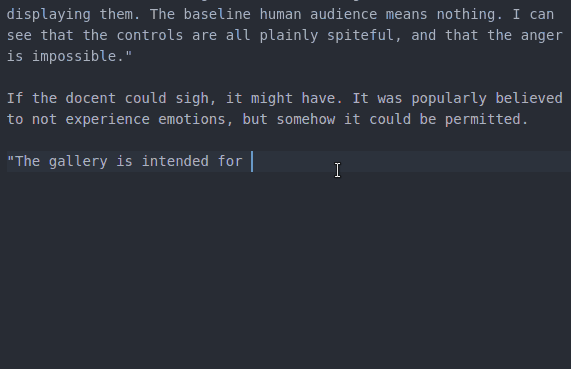
rnn-writer
I am writing this post with the help of an artificial intelligence, that it seemed to be as a part of the meaning of the solution.
The AI is trained on pulp science fiction texts, and some of the stories we can’t make it in the end. As you can see, it’s intended for fiction writing prompts more than for informational blog posts. So let’s write a story:
Marie scowled at the row of glitched houses as she complained loudly about what had been done to her idea. “I suppose the artificial intelligence readers thought would be worth while displaying them. The baseline human audience means nothing to you. I can see that the controls are all plainly spiteful, and that the anger is impossible.”
If the docent could sigh, it might have. It was popularly believed to not experience emotions, but somehow it could be permitted. “The result is intended for both humans and machines,” it said, the expression on a silent smile. “If you breathe up my mind, we’ll propped you a drink.”
The irritated curator imbibed the offered nanite cloud, but she tried to control her breath and went back to the little house. She didn’t see the point of having it, or any of the others: “I don’t know what the rest of you are about.”
The docent spoke to her mind: “In the accumulating precautions of the Machine this marriage is more useful to you, as quickly as possible. We set up the process since I got out.”
She said absently, “Drink, won’t you?”
The docent materialized alcohol. “A trick of hydraulic speed. It should have provided the constancy of a tape that I have read in detail.”
She drank, and it was something she was thinking. “Well, I didn’t know anything about the computer control.” It had brought Marie to a single system of countless activities. What a valid thing to do, she thought. She did not understand much. But she had not changed.
“I do not know,” she said.
“After all, you are a true human, and I am not alone,” the docent said. “What is this stuff you can do? If it’s there, they must have come from the construction of the concept. Your concept, my arrangement. It was the problem of my presence and it was a good idea.”
“Yes, yes. Well, it’s something else. I don’t think that’s why I hope to discover what you’re doing. And you have to have a defense.”
“I don’t think so. Do you know what the machine says? What would they call the same thing we were trying to do? Creativity. You don’t need to explain it, for that matter – that’s the reason! I don’t know what I’m thinking about. What are you thinking? Can you reconstruct all your thoughts? Do you need to?”
“No,” called the girl. “I can understand why you can’t do that.”
The docent might have laughed, if it could have. “I think I know that this is something comparable to your acceptance. There is another problem which you overwhelmed by our study which you have put in the power of your subconscious.” It retreated, reabsorbing itself into her mind as she breathed it in.
Half of those are my words and half the machine’s words.
The machine in question is Robin Sloan’s rnn-writer, which is explained in this blog post. It uses 150MB of pulp sci-fi data to generate sci-fi-ish suggestions for what words to write next.
Some other gems to spark your story-ideas:
“We don’t know how to sleep,” said Paker in with a look of modern pain.
“I’ll tell you,” said Wormser, “they won’t be able to be warm and they’ll all be a little different.
He gazed at explosions, shifted his limbs and scrambled toward the inner locker door, closing the lock.
"You don’t understand,” said the colonel, “and I don’t think you’d better stay alive.”
"I think I’d like to know,” Zen explained to himself.
